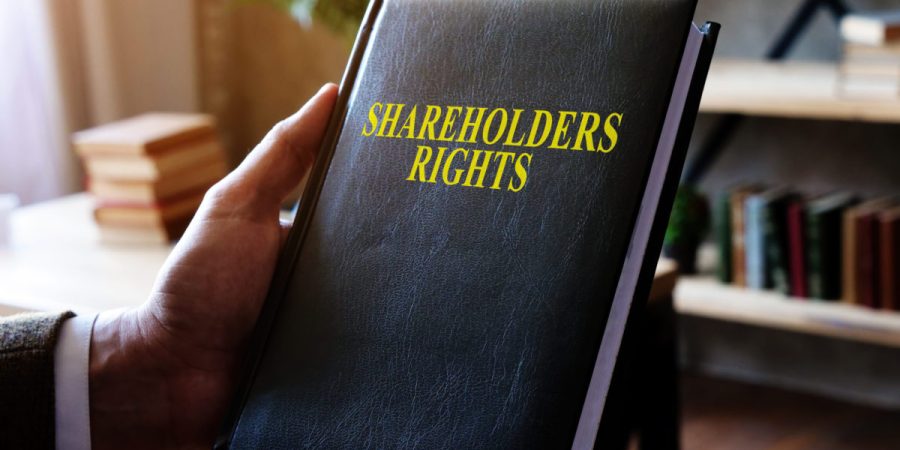Are you a shareholder in a Singapore company? As a shareholder, you’re an owner of the company. You have rights that you can enforce legally. Learn about the 10 key rights of shareholders here.
| No. | Shareholder Right |
| 1 | Right to vote |
| 2 | Right to dividends |
| 3 | Right to protection of personal assets from company liability |
| 4 | Right to not be treated oppressively |
| 5 | Right to access company information |
| 6 | Right to call for and attend company meetings |
| 7 | Right to ensure company is in compliance with regulations |
| 8 | Right to pre-emptive share purchases |
| 9 | Right to sue company, or to sue another entity on behalf of the company |
| 10 | Right to wind company up and to company’s assets after winding up |
Shareholder Right 1: Right to vote
Shareholders who own voting shares are entitled to vote on company decisions.
Shareholders who own ordinary shares are entitled to vote on company matters. For instance, shareholders can vote on company decisions like appointing and removing directors, appointing and removing company secretaries, or changing the company address.
Do all shareholders have voting rights?
No. Only shareholders who own ordinary shares (or shares with voting rights, whatever these shares may be called by the company), have voting rights.
A company may have different types of shares. For example, a company could have Class A, Class B, and Class C shares. The company could structure the share classes such that Class C shares do not have voting rights. Therefore, if you own Class C shares only, you would not have the right to vote on company decisions. It is quite common for startups to have multiple share classes, with different voting rights per share class.
Companies may also have super-voting shares, which provide the owners with multiple votes per share. Facebook is a good example of this. Facebook’s Class A shares get 1 vote per share. However, Facebook’s Class B shares have 10 votes per share. Mark Zuckerberg, Facebook’s CEO, controls the majority of Class B shares, giving him about 58% of the voting rights in the company.
Shareholder Right 2: Right to dividends
Shareholders have a right to receive dividends.
For a company to declare dividends, at least 50% of shareholders must vote for and approve a resolution to pay dividends. For instance, if you own 10% of a company’s shares, you cannot simply demand 10% of the company’s profits. You must get at least another 40% of the shareholders to agree with you before dividends can be paid out.
Companies usually declare final dividends after the financial year has been concluded. Once a final dividend has been declared and approved by shareholders, it must be paid out. A company cannot suddenly renege on its promise to pay dividends once it declares final dividends.
Shareholder Right 3: Right to protection of personal assets from company liability
Shareholders in a Private Limited company generally enjoy the right of limited liability. This means that each shareholder’s personal assets, like their house, car, and bank savings, are in most cases protected if the company owes money to others, or if the company is sued. For instance, if the company goes bankrupt, other people or companies cannot seize shareholders’ personal assets to pay off the company’s debts. Limited liability protections mean that the most a shareholder will lose is the amount they spent purchasing company shares, and the amount they loaned to the company (if the company has not paid back the shareholder loan).
There are important exceptions to this rule of limited liability, though.
If a shareholder is also a director of the company, they can be held personally liable in some situations. For instance, if the shareholder-director continues running the business knowing that the company is already insolvent, or if they defraud others using the company, their personal assets can be exposed to legal claims. Read more about personal shareholder-director liability here.
Shareholder Right 4: Right to not be treated oppressively
This is most applicable for minority shareholders. Majority shareholders cannot take actions that would prejudice the rights of minority shareholders. An example would be majority shareholders paying themselves obscenely high salaries, so as to transfer company income from the minority shareholders to majority shareholders. In such cases, minority shareholders can exercise their rights to be treated fairly by suing the majority shareholders for shareholder oppression.
Shareholder Right 5: Right to access company information
Shareholders have the right to request access to:
- Company financial statements (income statements, balance sheets, cash flow statements, etc.)
- Conduct audit on financial statements
- Directors’ compensation information
- Auditors’ compensation information
- List of all shareholders of the company (% owned does not need to be declared, but shareholders have a right to know who is a shareholder)
- Minutes of shareholder meetings (shareholders generally do not need to be provided access to minutes of board meetings)
If an AGM is not held, then shareholders have the right to receive financial statements and related documents within 5 months after the end of the financial year.
Right to request for company to audit its financial statements
Most companies in Singapore are exempt from having audited accounts. However, if shareholders who own at least 5% of the company make a request, the company must audit its accounts and present it to shareholders.
Right to request for information on director’s compensation
Shareholders have the right to request for information on directors’ compensation. At least 10% of all shareholders, or shareholders who own at least 5% of the company’s shares, must make this request. The company must disclose this information within 14 days of the request being made.
This is to provide checks and balances on directors potentially being paid excessive amounts of compensation, which might sway their objectivity in representing shareholder interests. If shareholders feel directors are being too much or are not performing their job well, they can vote to remove the directors.
Right to request for information on auditors’ compensation
Shareholders have the right to request for information on auditors’ compensation. At least 5% of all shareholders, or shareholders who own at least 5% of the company’s shares, must make this request. The company must disclose this information immediately after the request is made, with some time allowed for preparation of the necessary information.
This is to provide checks and balances on auditors potentially being paid excessive amounts of compensation, which might sway their ability to properly audit the company’s finances. If shareholders are not happy with the auditor’s performance, and/or if they feel the auditor is being paid too much, they can vote to remove the company’s auditor.
Shareholder Right 6: Right to call for, and attend company meetings
Calling for an Annual General Meeting (AGM)
Shareholders have the right to call for an AGM. Even if companies have held a shareholder vote to dispense with holding AGMs, shareholders still can call for AGMs. As long as a shareholder calls for an AGM within 6 months after a company’s financial year ends, the company must hold an AGM. The shareholder must send written notice calling for the AGM, at least 14 days before this 6-month deadline.
Calling for an Extraordinary General Meeting (EGM)
Any shareholder(s) with at least 10% of the company’s shares can call for an EGM. Once the right to call the EGM is exercised, the company must hold the EGM within 2 months of the request being made.
Attending shareholder meetings
Shareholders have the right to attend all the company’s shareholder meetings. They can voice their opinions on any issues that are scheduled for discussion during the meeting.
Shareholder Right 7: Right to ensure company is in compliance with regulations
Right to ensure compliance with Company Constitution
All shareholders have the right to ensure that the company, along with all other shareholders, follow the clauses, roles, and responsibilities set out in the company’s constitution.
The company’s constitution will govern important functions of the firm, like share transfer procedures, directorship appointment procedures, and various rules on how to run the company and resolve potential disputes. If the company is flouting the procedures or rules in its constitution, shareholders have a right to demand that the company stop its errors and comply with the constitution’s wordings.
Right to ensure compliance with Companies Act
All shareholders have the right to ensure that the company, along with all other shareholders, follow the laws set out in the Companies Act. Any shareholder who believes the company or other shareholders are breaching the Companies Act can apply to the Courts to stop such illegal actions.
Shareholder Right 8: Right to pre-emptive purchase of shares
Most company constitutions/shareholder agreements will grant shareholders the right to be offered shares for purchase, before the shares are sold to any outsider. This is known as having “pre-emptive rights”. Pre-emptive rights are not a legal requirement, but most companies will offer them to shareholders.
It’s in the best interests of shareholders to agree to pre-emptive rights. You want to have the first say on purchasing shares from other shareholders, or from the company itself if new shares are issued. For rapidly growing companies, having first dibs on shares could dramatically increase your wealth if the value of your shares goes up. Also, you don’t want other shareholders selling ownership of your company to random outsiders willy-nilly. Outsiders may have less friendly motivations in acquiring shares of your company, so the ability to purchase shares first is important to limit the chance of introducing a Trojan horse into your company.
Shareholder Right 9: Right to sue company, or to sue someone else on behalf of the company
Right to sue the company
A shareholder can sue their own company. Usually, this is done in cases of shareholder oppression. If the company is unfairly impinging on a shareholder’s rights, they can sue the company to stop them from oppressing the shareholder’s rights. Also, shareholders can sue the company (and the company’s directors and officers) if it is not acting in the shareholders’ best interests. For instance, some directors may engage in conflicts of interests (e.g. using company money to fund their own outside business ventures). In such cases, shareholders can sue the firm to claim damages, and to stop the company from violating shareholder interests.
Right to sue someone else on behalf of the company
Shareholders have the right to sue another person or entity on behalf of the company. To do so, the shareholder must apply to the Singapore Courts for permission to begin the lawsuit. Suing someone else on behalf of the company is known as a “derivative lawsuit” or “derivative action”. Usually, derivative lawsuits are initiated against company insiders, such as directors who have breached their duties. Shareholders can then sue these directors on behalf of the company, so that the company can claim compensation for the director’s breach of duties.
Shareholder Right 10: Right to wind company up, and right to own company assets after winding up
Shareholders have the right to apply to the Courts to wind up the company. Usually, a voluntary winding up is done in exceptional cases where relationships between shareholders have broken down completely, or the company is heavily indebted and cannot continue operations. The legal term for such voluntary shut downs are called “winding ups on just and equitable grounds”.
Some examples of this are:
- 50:50 shareholders are at a deadlock. Shareholder Agreement does not contain a buy-out clause to resolve this deadlock. Either shareholder (or both) can apply to have the company wound up.
- The company no longer wishes to, or is capable of, carrying out its business.
- The company is insolvent/bankrupt.
Shareholders have a right to the company’s assets once the firm has been wound up. A shareholder’s claim on company assets is last in line. All creditors must be paid off first before shareholders can be paid. Also, amongst shareholders, preference share owners must be paid before ordinary share owners.
What happens if someone else holds my shares for me?
These 10 rights above normally only apply if your name is in the company’s list of shareholders. If your shares are being held for you via a nominee, then your nominee will have to exercise your rights for you.
Ready to protect your business?
Provide offers business owners the quickest and easiest way to protect their companies.
Click the links below to get your insurance online, in just 3 mins. Premiums are amongst the lowest nationwide.
| Coverage | Explanation | Premium |
| Professional Indemnity Insurance | Covers business-related lawsuits | From $42/month – buy online now |
| Commercial Property Insurance | Covers property damage from fire, explosions, certain types of water damage, etc.
Covers building structure, renovations, fixtures & fittings, equipment, & more. | From $12/month – buy online now
|
| Public Liability Insurance | Covers lawsuits related to injuries or property damage to third-parties (e.g. members of the public). | From $9/month- buy online now |
| Work Injury Compensation Insurance (WICA Insurance) | Covers your employees from work-related injuries/sickness, including Covid-19.
Pays up to $45,000 medical expenses per worker. | From $5/month, per worker- buy online now |



